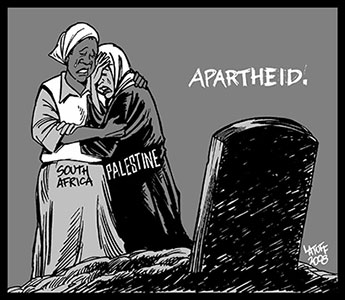Nineteen years after the end of apartheid, South Africans are still passionately divided over whether Margaret Thatcher helped or hindered the cruel system of white rule and prolonged the jailing of Nelson Mandela.
The heated discussions triggered by Thatcher’s death show how influential South Africans believe she was on the fate of the last bastion of white-minority rule in Africa.
The former British leader supported the apartheid government when it was at its deadliest, killing many in the late 1980s in state terrorism at home and abroad in bombing and cross-border raids on neighboring states accused of harboring guerrilla fighters, said Pallo Jordan, a former Cabinet minister and stalwart of the governing African National Congress.
“Maggie Thatcher and Britain were important figures … they were defending South Africa, they were preventing international sanctions (against the apartheid government),” said Jordan to The Associated Press.
“Many lives were lost (as a result of the apartheid regime). I don’t think it’s a great loss to the world,” Jordan said of Thatcher’s death. She died after a stroke Monday at the age of 87.
“I say good riddance,” said Jordan on South Africa’s Talk Radio 702.
Thatcher branded Mandela and his ANC movement “terrorist,” amid concerns that they received backing from the former Soviet Union during the Cold War era and because of their guerrilla war for democracy.
Jordan was at Mandela’s first meeting with Thatcher after his release from 27 years in jail, at Downing Street in London in 1990.
“What amused the old man (Mandela) more than anything else was that here she was engaging in a conversation with this man that she thought an arch-terrorist.” He said Mandela’s inherent charm disarmed “the Iron Lady,” and the meeting passed without confrontation.
Thatcher’s spokesman said in 1987 that anyone who thought the ANC, then the leading anti-apartheid movement in South Africa, would govern South Africa was “living in cloud cuckoo-land.”
But others argue that Thatcher was strongly opposed to apartheid and racism and helped influence the apartheid government to free Mandela.
“Thatcher did more to release Nelson Mandela out of prison than any of the other hundreds of anti-apartheid committees, in Europe,” Pik Botha, the last foreign minister of the apartheid regime, said Tuesday on Talk Radio 702 in Johannesburg.
F.W. de Klerk, the last apartheid-era president of South Africa, said in a statement that Thatcher, whom he called a friend, was “a steadfast critic of apartheid.” He said she had a better grasp of the complexities and realities of South Africa than many of her contemporaries.
“She exerted more influence in what happened in South Africa than any other political leader who at that stage was in the international political stage,” de Klerk said. He said Thatcher “correctly believed” that more could be achieved through constructive engagement with his government than international sanctions and isolation of the South African government.
Thatcher argued that sanctions were immoral because they would hurt South African blacks and throw thousands out of work. Her stance allowed British companies to continue operating in apartheid South Africa, where the United Kingdom was the biggest trading partner and foreign investor.
In 1984, Thatcher allowed four white South Africans to return home after they were arrested in Britain for allegedly trying to buy weapons for the apartheid regime in contravention of a U.N. arms embargo. The South African government refused to force the group called “the Coventry Four” to return to Britain for trial, forfeiting 200,000 pounds sterling in bail.
Thatcher finally was forced to follow the lead of the U.S. Congress, which in 1986 imposed sanctions with the passage of the Comprehensive Anti-Apartheid Act that had been sponsored by a minority of U.S. legislators since 1972. Congress took action and overrode Reagan’s presidential veto after South Africa attacked Zimbabwe, Zambia and Botswana — all members of the Commonwealth of Britain and its former colonies — on the same day that a Commonwealth representative was visiting South Africa, recalled Pallo Jordan.
Sorce:The Washington Post
M.D

